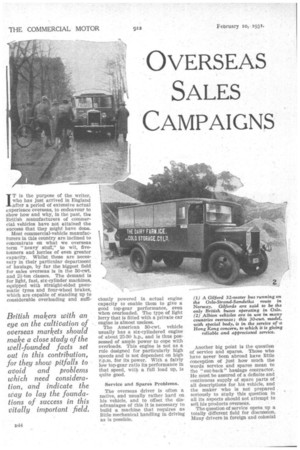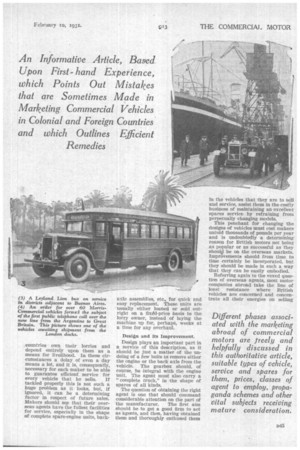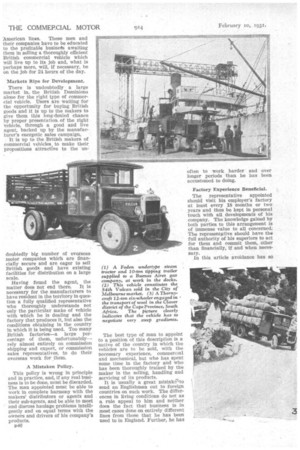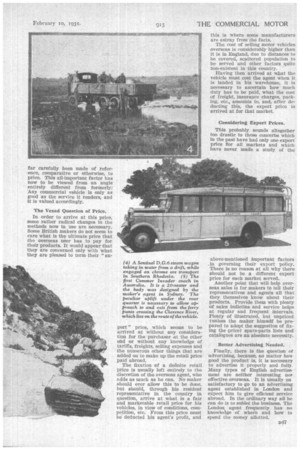OVERSEAS SALES CAMPAIGNS
Page 114

Page 115

Page 116

Page 117

If you've noticed an error in this article please click here to report it so we can fix it.
IT is the purpose of the writer, who has just arrived in England after a period of extensive actual experience overseas, to endeavour to show how and why, in the past, thg British manufacturers of commercial vehicles have not attained the success that they might have done.
Most commercial-vehicle manufacturers in this country are inclined to concentrate on what we overseas term "heavy stuff," to wit, fivetonners and lorries of even greater capacity. Whilst these are necessary in their particular department of haulage, by far the biggest field for sales overseas is in the 30-cwt. and 2i-ton classes. The demand is for light, fast, six-cylinder machines, equipped with straight-sided pneumatic tyres and four-wheel brakes, which are capable of standing up to considerable overloading and suffi ciently powered in actual engine capacity to enable them to give a good top-gear performance, even when overloaded. The type of light lorry that is fitted with a private car engine is almost useless.
The American 30-cwt. vehicle usually has a six-cylindered engine of about 25-30 h.p., and is thus possessed of ample power to cope with overloads. This engine is not as a rule designed for particularly high speeds and is not dependent on high r.p.m. for its power. With a fairly low top-gear ratio its performance in that speed, with a full load up, is quite good.
Service and Spares Problems.
The overseas driver is often a native, and usually rather hard on his vehicle, and to offset the disadvantages of this it is necessary to build a machine that requires as little mechanical handling in driving as is possible. Another big point is the question of service and spares. Those who have never been abroad have little conception of just how much the words service and spares mean to the " out-back " haulage contractor. He must be assured of a definite and continuous supply of spare parts of all descriptions for his vehicle, and the maker who is not prepared seriously to study this question in all its aspects should not attempt to sell his products overseas.
The question of service opens up a totally different field for discussion. Many drivers in foreign and colonial countries own their lorries and depend entirely upon them as a means for livelihood. In these circumstances a delay of even a day means a lot, and it is, consequently, necessary for each maker to be able to guarantee efficient service for every vehicle that he sells. If tackled properly this is not such a huge problem as it looks, but, if ignored, it can be a determining factor in respect of future sales. Makers should see that their overseas agents have the fullest facilities for service, especially in the shape of complete spare-engine units, back axle assemblies, etc., for quick and easy replacement. These units are usually either loaned or sold outright on a fixed-price basis to the lorry owner, instead of laying the machine up for, perhaps, weeks at a time for any overhaul.
Design and its Improvement.
Design plays an important part in a service of this description, as it should be just a matter of the undoing of a few bolts to remove either the engine or the back axle from the vehicle. The gearbox should, of course, be integral with tile engine unit. The agent must also carry a "complete truck," in the shape of spares of all kinds.
The question of obtaining the right agent is one that should command considerable attention on the part of the manufacturer. The first aim should be to get a good firm to act as agents, and then, having obtained them and thoroughly enthused them In the vehicles that they are to sell and service, assist them in the costly business of maintaining an excellent spares service by refraining from perpetually changing models.
This penchant for changing the designs of vehicles must cost makers untold thousands of pounds per year and is undoubtedly a determining reason for British motors not being as popular or as successful as they should be on the overseas markets. Improvements should from time to time certainly be incorporated, but they should be made in such a way that they can be easily embodied.
Referring again to the vexed question of overseas agents, most motor companies abroad take the line of least resistance where British vehicles are concerned and concentrate all their energies on selling American lines. These men and their companies have to be educated to the profitable businets awaiting them in selling a thoroughly efficient British commercial vehicle which will live up to its job and, what is perhaps more, will, if necessary, be on the job for 21 hours of the day.
Markets Ripe for Development.
There is undoubtedly a large market in, the British Dominions alone for the right type of commercial vehicle. Users are waiting for the opportunity for buying British goods and it is up to the makers to give them this long-denied chance by proper presentation, of the right vehicle, through a good and live agent, backed up by the manufacturer's energetic sales campaign.
It is up to the British makers of commercial vehicles to make their propositions attractive to the us doubtedly big number of overseas motor companies which are financially secure and are eager to sell British goods and have existing facilities for distribution on a large scale.
Having found the agent, the matter does not end there. It is necessary for the manufacturers to have resident in the territory in question a fully qualified representative who thoroughly understands not only the particular make of vehicle with which he is dealing and the factory that produces it, but also the conditions obtaining in the country in which it is being used. Too many British factories—a large percentage of them, unfortunately— rely almost entirely on commission shipping and export, or commission sales representatives, to do their overseas work for them.
A Mistaken Policy.
This policy is wrong in principle and in practice, and, if any real business is to be done, must be discarded. The man appointed must be able to work in complete harmony with the makers' distributors or agents and their sub-agents, and be able to meet and discuss haulage problems intelligently and on equal terms with the owners and drivers of his company's products.
146 The best type of man to appoint to a position of this description is a native of the country in which the vehicles are to be sold, with the necessary experience, commercial and mechanical, but who has spent some time in the factory and who has been thoroughly trained by the maker in the selling, handling and servicing of its products, It is usually a great mistakc.—to send an Englishman out to foreign countries on such work. The differences in living conditions do not as a rule appeal to him and neither does the fact that business is in most cases done on entirely different lines from those that he has been used to in England. Further, he has Factory Experience Beneficial.
The representative appointed should visit his employer's factory at least every 18 months or two years and thus be kept in personal touch with all developments of his company. The knowledge gained by both parties to this arrangement is of immense value to all concerned. The representative should have the full authority of his superiors to act for them and commit them, other than financially, if and when necessary.
In this article avoidance has so far carefully been made of reference, comparative or otherwise, to price. This all-important factor has now to be viewed from an angle entirely different from formerly: Any commercial vehicle is only as good as the service it renders, and it is valued accordingly.
The 'Vexed Question of Price.
In order to arrive at this price, some rather radical changes in the methods now in use are necessary. Some British makers do not seem to care what is the ultimate price that the overseas user has to pay for their products. It would appear that they are concerned only with what they are pleased to term their " ex
port" price, which seems to be arrived at without any consideration for the purchaser at the other end or without any knowledge of tariffs, freights, selling expenses and the numerous other things that are added on to make up the retail price paid abroad.
The fixation of a definite retail price is usually left entirely to the discretion of the overseas agent, who adds as much as he can. No maker should ever allow this to be done, but should, through his resident representative in the country in question, arrive at what is a fair and marketable retail price for his vehicles, in view of conditions, competition, etc. From this price must be deducted his agent's profit, and
this is where some manufacturers are astray from the facts.
The cost of selling motor vehicles overseas is considerably higher than it is in England, due to distances to be covered, scattered population to be served and other factors quite non-existent in this country.
Having then arrived at what the vehicle must cost the agent when it is landed in his warehouse, it is necessary to ascertain how much duty has to be paid, what the cost of freight, insurance charges, packing, etc., amounts to, and, after deducting this, the export price is arrived at for that market.
Considering Export Prices.
This probably sounds altogether too drastic to those concerns which in the past have had only one export price or all markeis and which have never made a study of the above-mentioned important factors in governing their export policy. There is no reason at all why there should not be a different export price for each market served.
Another point that will help overseas sales is for makers to tell their representatives and agents all that they themselves know about their products. Provide them with plenty of sales bulletins and service helps at regular and frequent intervals. Plenty of illustrated, but unpriced (unless the maker himself be prepared to adopt the suggestion of fixing the price) spare-parts lists and catalogues are an absolute necessity.
Better Advertising Needed.
Finally, there is the question of advertising, because, no matter hou good the product is, it is necessary to advertise it properly and fully. Many types of English advertisement are neither interesting no effective overseas. It is usually un satisfactory to go to an advertising agent established in London and expect him to give efficient service abroad. In the ordinary way all he can do is to sublet the business. The London agent frequently has no knowledge of where and how to spend the money allotted.




























































































































































































